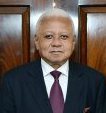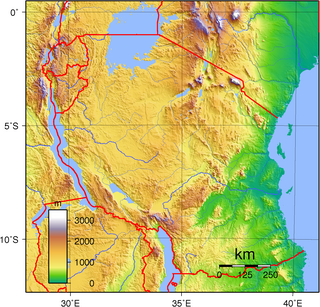Related Research Articles
The modern-day African Great Lakes state of Tanzania dates formally from 1964, when it was formed out of the union of the much larger mainland territory of Tanganyika and the coastal archipelago of Zanzibar. The former was a colony and part of German East Africa from the 1880s to 1919 when, under the League of Nations, it became a British mandate. It served as a British military outpost during World War II, providing financial help, munitions, and soldiers. In 1947, Tanganyika became a United Nations Trust Territory under British administration, a status it kept until its independence in 1961. The island of Zanzibar thrived as a trading hub, successively controlled by the Portuguese, the Sultanate of Oman, and then as a British protectorate by the end of the nineteenth century.
"Mungu ibariki Afrika" is the national anthem of Tanzania. It is a Swahili language version of Enoch Sontonga's popular hymn "Nkosi Sikelel' iAfrika".

Sir Hector Horace Hearne was an English barrister and judge.
The Chief Justice of Zanzibar is the highest judge of Zanzibar, part of the state United Republic of Tanzania. He is appointed by the President of Zanzibar in consultation with the Judicial Services Commission and presides over the High Court for Zanzibar.
In 1964 Tanganyika and Zanzibar formed the United Republic of Tanzania. After the Treaty of the Union, the two countries continued to remain with their own legal systems including court structures. In the 1977 Constitution of the United Republic of Tanzania, the High Court of Tanganyika whose jurisdiction was and still is territoriality limited to Tanzania Mainland was called the High Court of Tanzania and the High Court of Zanzibar retained its original name. It is essential to note that the High Court of Tanzania only has territorial jurisdiction over legal issues arising in Tanzania Mainland and the High Court of Zanzibar has territorial jurisdiction over legal issues arising in Zanzibar.
The Articles of Union of Tanganyika and Zanzibar of 1964 is the main foundation of the Constitutions of the United Republic of Tanzania of 1977 and the Zanzibar Revolutionary Government of 1984. The Articles of the Union were signed on April 22, 1964, by the Founders of the Union, Julius Nyerere and Abeid Amani Karume and agreed in 11 matters which later increased to over 22 and are the source of tension and dispute between mainland Tanzania mainland and Zanzibar. See Uamsho movement. The original Articles of Union which contain both Signatures from Nyerere and Karume are yet to be found.

Elizabeth II was Queen of Tanganyika from 1961 to 1962, when Tanganyika was an independent sovereign state and a constitutional monarchy. She was also the monarch of other sovereign states, including the United Kingdom. Her constitutional roles in Tanganyika were mostly delegated to the governor-general of Tanganyika.

Mohamed Chande Othman is a Tanzanian lawyer and a former Chief Justice of Tanzania.
Tanzania Commission for Universities (TCU) is the statutory and regulatory organization established in 2005 by the Tanzanian Government to oversee university education in Tanzania. It is the body whose recognition, approval and accredidation is needed before any university can started.

The Judiciary of Tanzania is the system of courts that interprets and applies the law in Tanzania. The current judiciary bases its foundation to the constitution of the United Republic of Tanzania of 1977. Under the Constitution of Tanzania, Justices and Magistrates are independent of the government and subject only to the Constitution and the law. The country has a dual juristition system where there is a judicial structure responsible for Tanzania Mainland and another for Zanzibar. The Court of Appeal of the United Republic was established in 1979 as the final appellate judicial body with jurisdiction over the entire union.

Mainland Tanzania refers to the part of Tanzania on the continent of Africa; excluding the islands of Zanzibar. It corresponds with the area of the former country of Tanganyika.
Damian Zefrin Lubuva has been serving as the chairman of the National Electoral Commission since 19 December 2011. He also served as the 4th Attorney General of Tanzania under Ali Hassan Mwinyi between 1985 and 1993. Along with these posts, Lubuva was also the Attorney General of Zanzibar, Minister for Justice and a Judge in the Tanzanian Court of Appeal.
Ibrahim Hamis Juma is a Tanzanian lawyer and the current Chief Justice of Tanzania.
Freedom of religion in Tanzania refers to the extent to which people in Tanzania are freely able to practice their religious beliefs, taking into account both government policies and societal attitudes toward religious groups.

Augustino Steven Lawrence Ramadhani was a Tanzanian jurist and Christian leader. He was Chief Justice of Tanzania from 2007 to 2010, and a Judge of the African Court on Human and Peoples' Rights from 2010 to 2016. From 2017 to 2018 he was episcopal vicar of the Diocese of Dar es Salaam.
Barnabas Albert Samatta is a retired Tanzanian lawyer and judge who was Chief Justice of Tanzania from 2000 to 2007.
Sir George Graham Paul, also known as Graham Paul or G. G. Paul, was a British jurist who served in the colonial administration in Nigeria, Sierra Leone and Tanganyika.

Sir Ralph Windham was a British lawyer who held various positions in the Colonial Legal Service.
Augustine Saidi, or Augustino B. Saidi, was a Tanzanian lawyer who was the first African Chief Justice of Tanzania.
References
- Chris Maina Peter & Helen K. Bisimba (2007). Law and Justice in Tanzania: Quarter of a Century of the Court of Appeal. Dar es Salaam: Mkuki na Nyota Publishers. ISBN 9987-449-43-3.
- Elizabeth Sleeman, ed. (2003). The International Who's Who 2004 . London: Europa Publications Ltd. ISBN 1-85743-217-7.
- Richard Fitzwilliams, ed. (1980). The International Who's Who 1981. London: Europa Publications Ltd. ISBN 0-905118-48-0.
- Heyns, Christof (1997). Human Rights Law in Africa, 1997. Vol. II. The Hague: Kluwer Law International. ISBN 90-411-1113-1.
- Martin, Robert (1974). Personal Freedom and the Law in Tanzania: A Study of Socialist State Administration . Oxford: Oxford University Press.
- Skinner, Annabel (2005). Tanzania & Zanzibar. London: Cadigan Guides. ISBN 1-86011-216-1.
